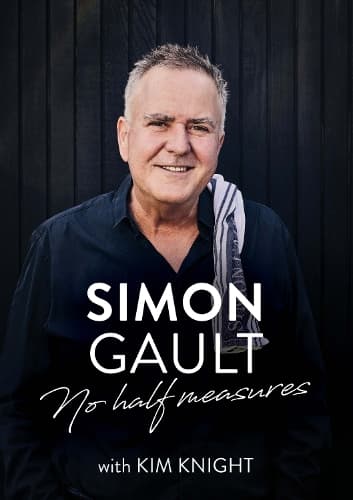Review: Simon Gault - No Half Measures
Reviewed by André Taber
Most Kiwis will know of Simon Gault as the most opinionated judge on MasterChef or from two decades of regular appearances in the press. He has ended up a bit of a caricature of a celebrity chef. Given 310 pages to tell his life story he confirms that what you see is what you get: a bit snobby about imported ingredients; a short temper with underperforming staff and complaining guests; lots of yarns about kitchen disasters narrowly avoided, encounters with famous people, fast cars and high jinks.
In the foreword to Gault’s first recipe book from 2004, Kevin Roberts wrote that Gault ‘believes nothing is impossible.’ This quality is a relentless theme of No Half Measures. We witness Gault fearlessly diving into every new project and coming up only to recite slogans which will sail him through any difficulty: ‘One team, one dream.’ ‘Lead, not follow.’ ‘I’m inspired by the unexpected.’ ‘If cherries are in season you want to see the tree.’ ‘It’s better to come second.’ ‘Five percent magic!’
Gault is a natural networker; the aforementioned Kevin Roberts gets a full-page publicity photo in No Half Measures. A business and marketing guru, Roberts was a customer in Gault’s first restaurant and became a friend and confidant. This book is a fascinating insight into their world, where there is not a lot of time to stop and think. (Slogan: ‘It’s frustrating when people can’t run as fast as I can’). Any librarians reading this review might want to add a catalogue subject under “business psychology.” Or they might also want to catalogue the book under “aviation.” Flying small aircraft is Gault’s hobby and a big part of his life, and three and-a-half chapters are devoted to it.
Short chapters make the memoir gallop at an entertaining pace. (But it’s not strictly chronological, so you must read until the end.) No Half Measures was compiled and written by Kim Knight, a veteran Auckland journalist whose specialities include food news and reviews, from phone and Zoom interviews done during a four-month period. Naturally this has resulted in a conversational tone – most of the time I heard the distinctive inflections of Gault’s speaking voice in my mind. It’s liberally sprinkled with stories from behind the restaurant scenes that made me chuckle; I’m always impressed with books that make me laugh.
Personally, I can’t get enough of reading about what goes on in restaurant kitchens and Gault’s story takes place during my formative years of becoming a gourmand and then a food writer. There’s some cracking detail about life as a restaurateur, from chef-proprietor Tony Astle’s kitchen at the seminal Auckland restaurant Antoine’s, to how the money for each restaurant opening was raised, to pivoting during the coronavirus pandemic. He talks about restaurant toilets a few more times than most readers would expect and even includes a photo of one he’s particularly proud of. (Slogan: ‘I want customers to be surprised’).
Gault’s career has taken place during a time of incredible growth for all forms of eating out. Illustrations include a menu from Bell House (opened by Gault at age 21 with four years’ cooking experience!) which is not only a portal into what food was fashionable in the ‘80s but the menu descriptions show off Gault’s innate gift of the gab. There’s also a smattering of recipes well chosen to represent the stages of Gault’s career – most of them are ridiculously easy, too. He name-checks dozens of people from the Auckland hospitality scene who will most likely never get a book deal for their own memoirs, creating a valuable record. Professionally, I’m currently trying to research New Zealand Chinese restaurants in the mid-20th century and I wish there had been more chroniclers like Gault.
Fans of MasterChef might be disappointed that Gault doesn’t share more behind-the-scenes stories. Some passages read a little too much like he’s promoting one of his current ventures but refreshingly Gault does address some of his flops in business and personal life. (Slogan: ‘Fail fast, fix fast.’)
Let’s address the celebrity chef thing. Gault repeatedly claims in No Half Measures that he never wanted to be, and has no interest in being, a public figure. His first inspiration was Des Britten – Aotearoa’s bone fide celebrity chef of the 1970s, before the phrase was even coined. Back in 2009, Gault was clearly one of the best candidates for the job of MasterChef judge. The memoir makes clear that he doesn’t mind a bit of personal attention for the sake of advancing his enterprises. Even at a barbecue, his slogan is, ‘You should have a crowd gathering.’
Reviewed by André Taber
